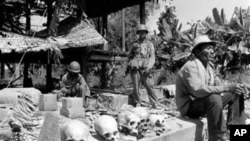Part Six: Reflections on the Future
In 2007, John Gunther Dean, the last US ambassador to Cambodia before it fell to the Khmer communists, turned over thousands of documents to the Jimmy Carter Library in Atlanta, Ga., part of the US National Archives. In doing so, the retired ambassador hoped to show today’s leaders that failure to negotiate leads to tragedy. This is the last in a series of reports on the Dean documents, being reissued for the 40th anniversary of the fall of Phnom Penh, in April 1975.
You can still feel his passion when John Gunther Dean speaks about his stint as the last US ambassador to Cambodia before it fell to the Khmer communists. Deep and persuasive, his voice rises and falls, as he pounds on the table, then retreats into thought before speaking again. In his last year in Cambodia, the countdown to Year Zero, he failed to bring peace to Cambodia’s warring factions. He left by helicopter, deeply saddened by failing the Cambodians. More than 30 years later, the ambassador told VOA Khmer, leaders should learn from the “uncontrolled solution” to Cambodia’s crisis.
“What I’m saying is: it is not enough just to pull out our troops,” he said. “We have to find an ending which may not be good for us, but it may show that we do care about others as well, especially those who have thrown their fate in with us.”
The former ambassador might have been talking about Cambodia, but also Iraq, or, even Lebanon. Anyone dealing with conflict among multiple parties with disparate ideas would benefit from the lesson of Cambodia in the 1970s, he said.
“You have responsibility, which doesn’t end when your troops leave,” he said. “You cannot just pull out. You have to try to find whatever is feasible, to avoid a tragedy, or in the case of Cambodia, a genocide.”
Dean cites as an example of success a negotiation in Laos, where as charge d’affairs he’d brokered a three-party peace between American-backed forces, communists and neutralists. Dean thought as chief of mission in Cambodia he was expected to do the same thing.
Robert Keeley was Dean’s deputy during his mission in Cambodia.
“I think the problem with Washington was that they didn’t feel like addressing the Cambodia problem as a problem in itself that could somehow be solved the way the Laos problem was solved,” Keeley said. “It was an appendage to the Vietnam War, which was the central front.”
If there’s a lesson to take from Cambodia, he said, it’s that diplomacy has a role, but it must be used before one side of a war has nearly won.
“The barbarians at the gate, so to speak, that’s not the time you can use diplomacy,” he said.
In the view of historian Kenton Clymer, the barbarians were at Phnom Penh’s gate by early 1975.
Clymer, who is chair of the history department at Northern Illinois University and the author of the soon-to-be-released book “Troubled Relations: the United States and Cambodia Since 1870,” said Dean had been a strong advocate of negotiating well before the situation turned dire, but no one listened.
“I mean, [Prince Norodom] Sihanouk had been willing to meet with the Americans since 1972, or maybe since 1971. He had put out all sorts of very explicit efforts to negotiate with the Americans, and they wouldn’t have anything to do with him.”
Secretary of State Henry Kissinger has always insisted the United States continually pursued peace in Cambodia, but that the Khmer Rouge—supported by China—simply were not interested in negotiating and were committed to total military victory well before Dean’s arrival in 1974. Kissinger would write that, after the summer of 1973, “I knew that Cambodia was doomed.”
It’s not clear if greater US efforts would have succeeded in the years following, Clymer said.
“I think the point is we just don’t know, because it was never really tried,” he said.
For his part, Dean said today’s policymakers should bring all the parties in the Middle East conflict to negotiation. The rigid adherence to a military solution was the downfall of US policy in Cambodia, and that could hold true today.
“Sooner or later, the opposition is going to get closer and closer, and militarily it is time to sit down and negotiate,” he said. “It was the refusal to find an alternative to military solutions which was the great drama in Cambodia.”
Failure to negotiate could have terrible effects in the region, he said, but it can also hurt America’s image as a world leader. Learn from Cambodia, he said, but look forward too.
“Let us look to the future,” he said. “America has a role to play, and for that, sometimes we have to look backwards, but let us always think about the future and new generations who are coming on the scene.”




